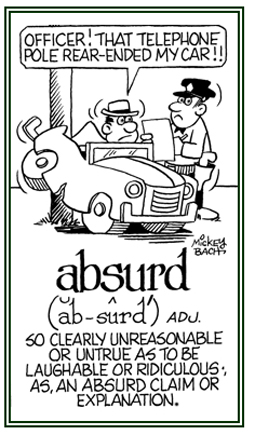surd-, -surd
(Latin: surdus, unheard, silent, dull; deaf)
Although an argument ab absurdo "demolishes" an opponent's position in debate, it does not necessarily prove the validity of that person’s position. The only thing that may be accomplished is that the ab absurdo argument may make the other person seem to be foolish or illogical.
2. Etymology: Latin "from the absurd" or "from nonsense".2. Pertaining to something that lacks any meaning that would give purpose to life: The young woman's absurd lifestyle seemed pointless and worrisome to her parents.
3. Concerning a condition of living in a meaningless universe where life has no purpose, especially as a concept in some twentieth-century philosophical movements: Jeremy, the university student, was determined to study the seemingly absurd lives of famous poets who had died young.
4. Relating to, or manifesting, the view that there is no order or value in human life or in the universe: The absurd theory about the meaninglessness of mortal existence did not appeal to James when he was attending the special lecture presented by a religious leader.
5. Descriptive of incongruity, senselessness; pertaining to a state of fabrication or untruth; unreasonable as to be laughable or ridiculous: The absurd quality of the theater production seemed to confuse the critics who were not sure if the drama was serious or just a joke.
Something is absurd when it is contrary to the first principles of reasoning. The statement that a part of something is greater than the whole is considered to be absurd.
Being monstrous and preposterous both refer to what is overwhelmingly absurd.

Go to this Word A Day Revisited Index
so you can see more of Mickey Bach's cartoons.
2. An act or instance of the ridiculous: The absurdisms which were portrayed on the stage upset the audience who expected a better production from the director and actors.
2. A reference to that which is inconsistent with reason, logic, or common sense: The absurdist student told his teacher that the dog had eaten his homework.
2. A person who acts or presents characteristics of being ridiculous: Mr. Potter, the politician, was described by some people as another in a series of absurdists who were candidates for mayor.
2. Anything that is considered to be lacking in order and meaning: For some students, mathematics is an absurdity and is an illogical process.
2. Inconsistent with the plain dictates of common sense; logically contradictory; nonsensical; ridiculous.
2. Descriptive of something ridiculously unreasonable, unsound, or incongruous: Mr. Anderson, the drama teacher, commented about the absurdness of the new play which was being developed by the students in his class.
This is an expression of the justification of one's faith on the basis that there is no need to understand: It is the essence of faith not to seek a rational explanation in matters that are spiritual.
This statement of belief is also given as Credo quia impossible est, "I believe it because it is impossible."
2. In mathematics, an irrational root or irrational number, or an expression containing one or the other.
3. Uttered, as an element of speech, without tone, or proper vocal sound; voiceless; unintonated; nonvocal; atonic; whispered; aspirated; sharp; hard, as f, p, s, etc.; opposed to sonant.
4. Etymology: from Latin surdus, "unheard, silent, dull"; possibly related to susurrus, "a muttering, a whispering".
2. A form of drama that emphasizes the absurdity of human existence by employing disjointed, repetitious, and meaningless dialogue, purposeless and confusing situations, and plots that lack realistic or logical procedures: Mrs. Willson, the drama teacher, told her students that the theater of the absurd, that they were expected to perform, should emphasize the main character's isolation in a bizarre and meaningless world.
